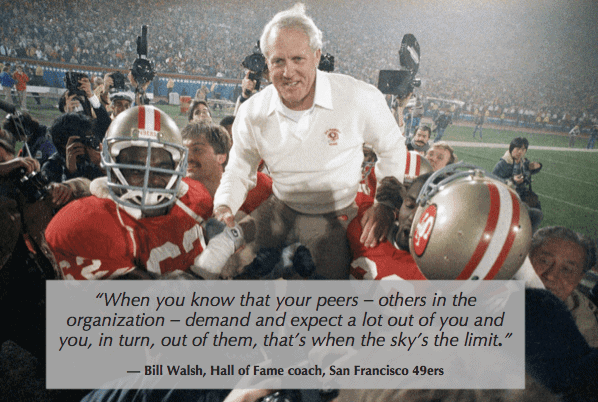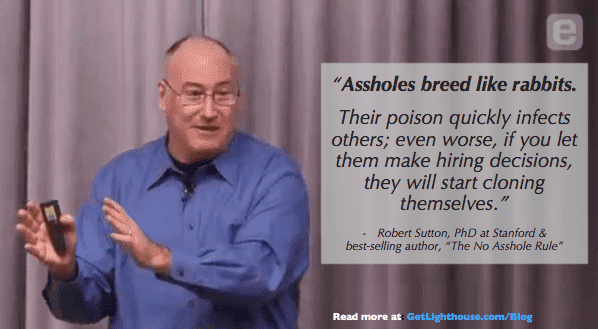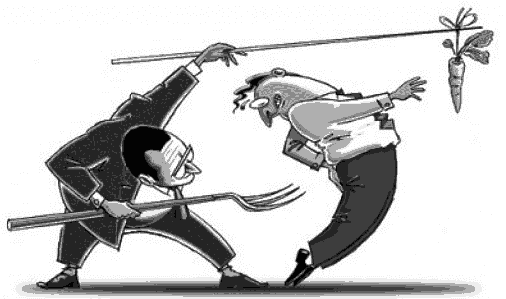There are 2 kinds of leaders in the world. On a bad day, many of us look like the former to some degree, and on great days, we are often the latter.
How often we are each depends on your leadership style, and how much self awareness you have to understand how you affect others.
Unfortunately, whether you're aware of the kind of leader you are, you will face the consequences of your leadership style. This can lead to problems including a disengaged team and retention issues, or a team that doesn't respect you or deliver as needed.
Today, we take a look at these 2 kinds of leaders, what their fatal flaws are, and how you can address the greatest weakness of each.
The Fatal Flaws of 2 Kinds of Leaders (and what to do about it)
You can stack up tips and tricks as a leader and make incremental improvements, but if you're on a shaky, or cracked foundation, it won't matter that much.
That's why we're writing about the subject today. Whichever of these two kinds of leaders you are, you need to address these fatal flaws. Otherwise, you'll find yourself caught in a brutal cycle of the same issues plaguing your career.
Kinds of Leaders with Fatal Flaws #1: Assholes that need to care more.
If you're this kind of leader, you drive your team hard. You may be fiercely critical. You get results…by any means necessary at times.
On the darkest side of this style of leadership, they can be abusive, abrasive, and cruel. They may harass, demean, or even humiliate staff. Think the dark side of Steve Jobs, or Darth Vader:

The problem with these kinds of leaders are that they demoralize their teams. Their turnover rates end up high, so they're constantly recruiting new people to churn through.
In the end though, you often can get promoted repeatedly being this way. Why? Because in the short term, this approach can get results. Drive your team hard, take advantage of those you can, and worry about any fallout later.
Unfortunately, as people like this get promoted, it leads to a culture in your company showing that to succeed you have to be like that, too.
Rewarding the wrong behavior gets expensive, fast.
As Robert Sutton says, assholes breed like rabbits. And they're expensive.
In his book The No Asshole Rule, he highlights a series of facts that show the true cost of assholes:
- People suffer physical & mentally: "Employees with abusive supervisors quit their jobs at accelerated rates, and those still trapped in their jobs suffered from less work and life satisfaction and productivity, trouble concentrating at work, and mental and physical health problems.”
- Negative experiences linger: "Negative interactions had a five-fold stronger effect on mood than positive interactions.”
- It causes more turnover than you think: Research in the UK showed "25% of bullied victims and 20% of witnesses quit their jobs.”
And if you think your tough love is worth it because of the results you get, think again.
In a working paper from Harvard Business School, Michael Housman and Dylan Minor were able to calculate the real cost of assholes:
"In comparing the two costs, even if a firm could replace an average worker with one who performs in the top 1%; it would still be better off by replacing a toxic worker with an average worker by more than two-to-one."
You can see further costs when you look at how the behaviors of some tech leaders caught up with them at places like Uber and Google.
What if I might be an asshole?
If you feel like you might be a bit like this, there's hope. The key for you is to develop rapport with your team, and make some efforts to show you care about them:
- Appreciate each of your team members' rhythm like Marissa Mayer does. A few reasonable accommodations is the difference between tough love and slave driver.
- Take a breath after a big win, so your team can relax and recover. Celebrate those wins like Mark C Crowley does.
- Save your harshest criticisms and feedback for private 1 on 1 times, not in front of the whole team.
- Consider the Task Relevant Maturity of your staff, so you avoid micromanaging when it's unnecessary and frustrating for them.
And if things are really bad, and you're losing people left and right, then you may need to take more drastic steps. Here's some thoughts on how to approach that:
- Learn why everyone is quitting at your work.
- Discover how managers like you can be the cause of low employee morale.
- When you need to take action yesterday, this step by step process can rebuild your broken team.
Kinds of Leaders with Fatal Flaws #2: Caring people that need to hold the line
There's another kind of leader that struggles: the one that cares too much.
We all want to be liked. We're social creatures who evolved to work in groups after all.
Unfortunately, as a leader, that can lead you astray. In an effort to be "liked” or be "friends” with your team, you can end up becoming soft or weak.
Standards slip. You make concessions little by little:
- "It was just that one time, we'll let it slide."
- "Okay, normally we wouldn't do that, but we'll make it work here."
- "They're really important to the team, so we can't afford to upset them."
"Just this one time" quickly becomes "often" or it even escalates. It's why you hear coaches talk about details like this in interviews:
https://twitter.com/mikeklis/status/1083444814107103235?s=21
Little details add up to big problems
Nowhere is this kind of problem more visible than what's happening to the Pittsburgh Steelers right now.
Mike Tomlin is a very successful NFL head coach. He's never had a losing season in the over a decade he's coached the Steelers. He's been to 2 Super Bowls, winning 1 of them.
Yet, with an uber-talented team this year, the Steelers missed the playoffs. And it turns out their Hall of Fame-caliber receiver walked out of practice, refused to answer calls from Tomlin and the owner, and then had to be benched in a critical end of season game.
Over the years, Coach Tomlin has been excusing this player, Antonio Brown, for all kinds of small things over the years: yelling at the defense and coaches in practice, coming late to meetings, live-streaming private post-game speeches, and more.
All that tolerance has broken the team:
- Players confessed chemistry is a mess.
- Many are frustrated by Antonio Brown's behavior and the coach's lack of dealing with it.
- The team now has to seriously consider trading one of their best players despite massive costs to their salary cap.
And all of this happened because Coach Tomlin was too nice a guy.
Rather than make tough calls to maintain discipline and a high standard, he let things slide, until there was no standard at all. This led to the Steelers having all kinds of sloppy, undisciplined play as they lost 4 of their last 6 to miss the playoffs.

What if I might care too much?
We all want to work with great people. We want to deliver great results and have happy customers. Yet, so many things get in the way of it.
As a leader, you have to hold the standard.
And it's not your ideal day, when everything goes your way. It's what you'll accept when things are going sideways.
- Do you ship subpar work, or hold back a project until it's truly ready?
- Have you excused someone for behavior that if everyone did it would lead to failure?
- Do you let your team off the hook, because "it's a little used feature”?
- Does someone's actions get excused, because they're really productive?
- Have you let an underperformer stay on the team because you like them?
As leaders, we're always in the spotlight. Your team is watching what you do, what you accept, and how you respond to everything. When you excuse things you shouldn't, you're signaling to your team your standards are dropping.
It's okay to be tough. You need to be tough sometimes.
The above video is one of my all time favorite videos on leadership. While he's speaking to CEOs and founders at a tech conference, his key line applies to *all leaders*:
"As a leader, you need to care deeply, deeply about your people...while not worrying or even caring what they think about you...managing by trying to be liked is the path to ruin."
If you're generally the caring leader, realize you're coming from a place of appreciation. If you're someone who typically cares, your team knows it. That means you can be hard on them sometimes.
They may groan a bit, but more importantly, they'll respect you. And they'll remember the standard you uphold and live up to it next time.
If you need help be more disciplined, consider some of these approaches:
- Here's how to give constructive feedback to your team to get results.
- For those on your team especially with low Task Relevant Maturity, be hands on to teach them the standard you expect.
- If you have an underperformer, follow this step-by-step guide on how to deal with low-engaging employees.
- Learn how Bill Walsh won 3 championships with the San Francisco 49ers and created the greatest coaching tree ever by being tough but caring as a leader.
The carrot and the stick.
One of the oldest management concepts everyone seems to think about with leadership is the carrot and the stick; you can threaten people and get some success, and you can incentivize people with the carrot to get things done, too.
The truth is, great leaders use both. And they learn to know when and how you need each.
Because a stick and no carrot is a jerk you can't wait to not work for.
While a carrot with no stick, is an undisciplined team who fails to deliver what they could.
Find your own recipe
I wish I could give you a perfect formula for how to apply this, but the truth is every leader and situation is different. It's part of the art of good management, and the best way to get better at it is to take time to reflect.
Think about who you are as a leader, and ask yourself which of the 2 kinds of leaders you are more like:
- If you asked your team to do something, or stop doing something, would they listen the first time?
- Is your team delivering to the standard you aspire to? When are they coming up short?
- Does your team fear talking to you? Do you fear talking to them?
- Do you try to be friends with your direct reports?
Only you can truly answer where you are on the spectrum from asshole to pushover. However, those around you can help. Ask those you trust (your boss, peers, former staff, etc) for their honest perspective.
It won't be fun always to hear, but it will help you get better, much faster. Ask them for examples and listen intently to see the cause and effect of your actions. Then work on changing when similar situations happen.
Over time, you'll see how your natural habits can help you in some situations, so don't stop everything you do. However, you'll also see in other cases you should consciously act to counter your worst habits. Doing this will help you create your own recipe for leadership that properly balances these two kinds of leaders.









